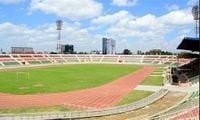Women’s football in East and Central Africa is set for a spectacular showcase this September as Nairobi, Kenya, prepares to host the 2025 CAF Women’s Champions League CECAFA Zone Qualifiers. After a successful bid by the Football Kenya Federation (FKF), the regional tournament returns to Kenyan soil, four years after the city staged the inaugural edition in 2021. The action will unfold across two premier venues: Nyayo National Stadium and Ulinzi Sports Complex, both ready to welcome teams and fans from across the region for a fortnight of high-stakes competition.
The qualifiers, scheduled from September 4 to 16, promise to be a vibrant celebration of talent, ambition, and the collective progress of women’s football in Africa. According to CECAFA Competitions Director Yusuf Mossi, bringing the tournament back to Nairobi is a testament to the city’s enduring football infrastructure and Kenya’s growing influence in the women’s game. "We are happy that the tournament will be returning to Kenya after the inaugural one was hosted there in 2021," Mossi stated, underscoring the significance of this moment for the host nation and the region at large.
Eight clubs from East and Central Africa will vie for the coveted spot at the CAF Women’s Champions League finals. The lineup features Kenya Police Bullets (Kenya), Top Girls Academy (Burundi), Yei Joint Stars (South Sudan), JKT Queens (Tanzania), Commercial Bank of Ethiopia (Ethiopia), Kampala Queens (Uganda), Rayon Sports Women (Rwanda), and JKU Princesses (Zanzibar). Each of these squads brings a unique story and a fierce determination to the pitch, with Commercial Bank of Ethiopia and Yei Joint Stars standing out for their consistency—both have participated in every edition since the competition’s inception.
Yet, the qualifiers will see notable absences. Sudan, Somalia, Eritrea, and Djibouti will not field teams this year, a development that shifts the competitive landscape and opens doors for new rivalries and emerging powerhouses. The absence of Sudanese representation is particularly striking, given the country’s recent footballing headlines. Just days ago, Sudan’s men’s national team, the Falcons of Jediane, captured continental attention by topping their group and storming into the quarter-finals of the African Nations Championship (CHAN) with a 4-0 demolition of Nigeria and a gritty goalless draw against Senegal at Amaan Stadium in Zanzibar, Tanzania.
Sudan’s Prime Minister Kamil El Tayeb Idris did not mince words in praising the Falcons, calling their achievement "a bright moment amid a critical period for the country." He emphasized the team’s role in restoring hope and unity, stating, "The national team renews hope in the Sudanese people that Sudan has a future." The Prime Minister’s comments reflect the broader significance of sport in a nation that has faced the loss of local stadiums in Khartoum due to ongoing conflict, forcing the relocation of football activities abroad. Despite these hardships, Sudan’s footballers have shown remarkable improvement and resilience, inspiring fans at home and in the diaspora.
Back in Nairobi, the focus shifts to the women’s game and the opportunity it presents for the region. The 2025 CECAFA Zone Qualifiers are not just a gateway to continental glory—they are a platform for emerging stars to stake their claim and for established clubs to reaffirm their dominance. The stakes are high: the winner will earn the right to represent the CECAFA region at the 2025 CAF Women’s Champions League finals, joining Africa’s elite in the battle for club supremacy.
Organizers have ensured the qualifiers will conclude before September 18, a strategic move to guarantee player availability for the upcoming FIFA U-20 Women’s World Cup qualifiers. This careful scheduling underscores the growing professionalism and coordination within African women’s football, as federations juggle multiple competitions and player commitments with increasing sophistication.
For Kenya, hosting the qualifiers is a point of national pride and a chance to build on the momentum generated by the FKF. The federation’s successful bid reflects a broader ambition to cement the country’s status as a regional football hub. The choice of Nyayo National Stadium and Ulinzi Sports Complex as venues signals confidence in the country’s ability to stage major events and provide world-class facilities for players and supporters alike.
The participating teams bring diverse backgrounds and ambitions. Kenya Police Bullets, representing the hosts, will be eager to capitalize on home advantage and the energy of local fans. JKT Queens from Tanzania and Kampala Queens from Uganda are both perennial contenders, while Commercial Bank of Ethiopia’s pedigree makes them early favorites. Yei Joint Stars, with their impressive record of participation, will look to convert experience into silverware. Meanwhile, Top Girls Academy, Rayon Sports Women, and JKU Princesses each have the potential to spring surprises and disrupt the established order.
Beyond the competition, the qualifiers are a celebration of how far women’s football has come in the region. The return of the tournament to Nairobi, the emergence of new clubs, and the growing professionalism of the event all point to a sport on the rise. The absence of teams from Sudan, Somalia, Eritrea, and Djibouti, while regrettable, also underscores the challenges that persist—but the overall direction is unmistakably positive.
As the countdown to September 4 begins, anticipation is building. Fans are eager to see which club will seize the moment and earn a place on the continental stage. Will Kenya Police Bullets deliver glory on home soil? Can Commercial Bank of Ethiopia maintain their remarkable consistency? Or will a new name etch itself into the history books?
One thing is certain: Nairobi is set to be the center of African women’s club football, with the eyes of the continent—and the world—watching. The 2025 CAF Women’s Champions League CECAFA Zone Qualifiers promise drama, skill, and unforgettable moments, as the region’s best battle for a shot at greatness. When the final whistle blows on September 16, a new chapter will be written, and a worthy champion will emerge to carry the CECAFA banner onto Africa’s grandest stage.

